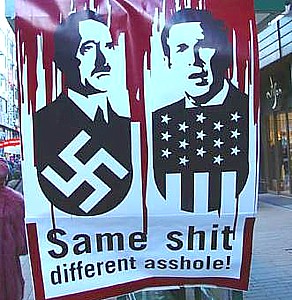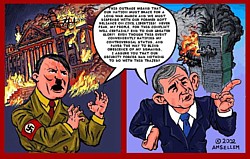Name Calling: Political Parties and the terms "Nazi" and "Hitler"
(back to top)
Often times a reference to Hitler is not used to describe government
sanctioned genocide, but rather the stifling of individual freedoms, imperialistic
foreign policy or the misuse of government programs. Throughout the past
60 years, presidents from John F. Kennedy to George W. Bush have been
criticized and called Nazi by their opponents. Interestingly, although
Hitler was neither the first nor the last leader to hold tight control
over his people and the government in which they lived or attempt to create
an imperialistic empire, his reputation is frequently invoked. Today,
the term Hitler is widely used in American vernacular by both liberals
and conservatives to try and coerce a knee-jerk dislike as well as fear
towards the person or action to which the comparison is made. Using both
the internet and The New York Times, we looked into how and why
politicians use the terms Hitler and Nazi. We found both conservatives
and liberals have used the term Hitler and Nazi to describe the same types
of incidents. For example, the biggest reason a liberal or a conservative
would call a leader a "Nazi" would be as a result of some imperialistic
or pre-emptive action This allusion comes from Hitler's famous Blitzkrieg,
in which he swiftly ran his armies over western Europe and gained power
in many countries, including Poland, the Netherlands and even France.
A conservative being likened to Hitler because of imperialistic actions
can be seen when Fidel Castro likened Reagan to Hitler after he bombed
Libya. Castro claimed this was irresponsible and opportunistic. Through
using this term, Castro is creating fear in the minds of the people. He
implies that Reagan might go on his own American version of Blitzkrieg
and start gobbling up more countries to exploit and force into submission.
Lyndon B. Johnson was likened to Hitler by Yugoslavian president Tito
after air raids in Vietnam. Tito claimed "constant air raids over
Vietnam, [and] the use of a communist menace to justify turning free people
into slaves of Fascism" (New York Times, Binder, David Tito
Likens Policy of US to Hitler's May 11, 1965) was LBJ's motivation. What
is interesting about these two criticisms is that although Reagan was
a conservative and LBJ was a liberal they were both likened to Hitler
for the same reasons: imperialism. Another interesting thing is they are
likened to Hitler by leaders of foreign countries. Both Castro and Tito
are outsiders who may or may not fear American capitalism spreading to
their countries. By using the Hitler term, they can invoke a memory from
the global community of a ruler who led the world into war. Both Tito
and Castro use this term to create fear of the American leaders and of
their motivations. This in turn creates distrust of American expansion
and a dislike of the leader who pushes this type of policy.
Another reason we found Presidents were being likened to Hitler was
because of domestic issues and policies. Chicago Mayer Richard Daley (a
democrat) claimed that Richard Nixon (a republican) asking for an election
recount was "Hitler type" propaganda (New York Times,
Wherweins, Austin Daley Sees Plot in Vote Recount, Dec. 2, 1960). This
came in response to the Nixon-Kennedy election which was actually quite
close. Therefore Nixon asking for a recount seems reasonable. So why would
Daley use this term? Perhaps Daley was worried a recount would show the
democrats had actually lost the election. Likening Nixon to Hitler discredits
Nixon's intentions and associates him with one of the most evil people
the world has known. It also casts him as a power-hungry rascal, trying
to use the system to gain power. Hitler gained power by going through
the appropriate channels, thus Nixon using the process is ominous. The
implication here is that Nixon gaining power would be a blow against the
democratic process and a tyrant leader would be in power.
LBJ was also likened to Hitler because of his policy of merging big business
with government and labor through his "Great Society" reforms.
Representative William Miller claimed that this merger was comparable
to Hitler's fascism, as the alliance between the government and business
gave Hitler increased power (N.Y. Times, Finney, John, Miller
Attacks Big Government, Oct 28, 1964). By using terms that invoke memories
of Hitler and his regime, there is a desire by the user to automatically
cause fear and suspicion. Both Miller and Daley, although one is a republican
and one is a democrat, hold positions of prominence within American society,
thus the using of the term from their positions is much different than
say, an average citizen's use of the term. This is because they have gained
the trust and respect of the people whom they lead. They cannot be discredited
as easily as the average person. Therefore, their use of the term is even
more dangerous to their opponent as well as more influential to the general
public.
Today the term is still thrown around by both conservatives and liberals
for more symbolic reasons than it has in the past. No longer is just imperialism
or preemptive war a basis for comparing a leader to Hitler. Instead anything
his family history to his supposed admiration of the ruler is concrete
enough to call someone Hitler. On blogs and websites the term Nazi or
a comparison to Hitler can be used toward anything the creator desires.
Bush is said to have Nazism in his blood, and therefore of course Bush
must be one as well claim liberals (http://www.tupbiosystems.com/articles/bush_nazi.html).
Clinton was also called a Nazi because of his apparent admiration of Hitler
say conservatives (newsmax.com). Both of these claims come from websites
searching for Clinton and Hitler and Bush and Hitler which were found
on the first page of google results, thus both are linked to heavily.
This comes as a departure from earlier comparisons by conservatives and
liberals for two reasons. The first is obvious, the web forum is MUCH
looser than the published page. No editors proofread it, nor do sources
have to be factual. The second reason has to do with the images accompanying
these types of claims. In numerous pictures Bush is shown in Nazi garb,
his name is spelled with a swastika instead of an "s," and Clinton
is shown with a Hitler type moustache. These images often are more widely
disseminated than the actual text on the matter and thus are much more
dangerous as they can provide an idea without using facts to support it.
It seems this type of imagery has become, for both conservatives and liberals,
become a sort of cannon in the corner used to spread ideas about the opposite
party without alienating people from within the party. For example, every
day conservatives and liberals can make outlandish claims in a politically
safe way because the leaders of the parties usually will not support these
claims. Thus although the public is exposed to these images and ideas,
their political parties manage to stay out of the fray and benefit from
the images provided.
Although during the 1960s to the 1980s the terms Hitler and Nazi were
mainly used to describe imperialist or pre-emptive foreign policies, today
the terms have become much more symbolic than descriptive. As Professor
Baron pointed out in reference to Holocaust movies, the Holocaust and
the way people think about it has become much more streamlined; thus shorter,
more vague references can be made. This seems to be true when it comes
to references between U.S. Presidents and Hitler. Because of the advent
of the internet, images and comparisons can be made just by using the
name or image of Hitler, not by actually explaining the reference. These
terms have clear, specific and symbolic meanings in the minds of many
people, even if those meanings are not historically accurate or complete.
|

 Although
political leaders from the time Hitler was in power to now have been likened
to Hitler and the Nazi party, both conservatives and liberals have also
made such comparisons in reference to anything from minor offenses to
major political moves. However, the justifications for using such phrases
appear to be the same for both conservatives and liberals. That is to
say that conservatives use the term Nazi against liberals for the same
reasons liberals call conservatives Nazis. Today, the term Hitler is widely
used in American vernacular by both liberals and conservatives as well
as international figures to try and coerce a knee-jerk reaction of instant
dislike as well as fear towards the person or action to which it is being
applied.
Although
political leaders from the time Hitler was in power to now have been likened
to Hitler and the Nazi party, both conservatives and liberals have also
made such comparisons in reference to anything from minor offenses to
major political moves. However, the justifications for using such phrases
appear to be the same for both conservatives and liberals. That is to
say that conservatives use the term Nazi against liberals for the same
reasons liberals call conservatives Nazis. Today, the term Hitler is widely
used in American vernacular by both liberals and conservatives as well
as international figures to try and coerce a knee-jerk reaction of instant
dislike as well as fear towards the person or action to which it is being
applied.